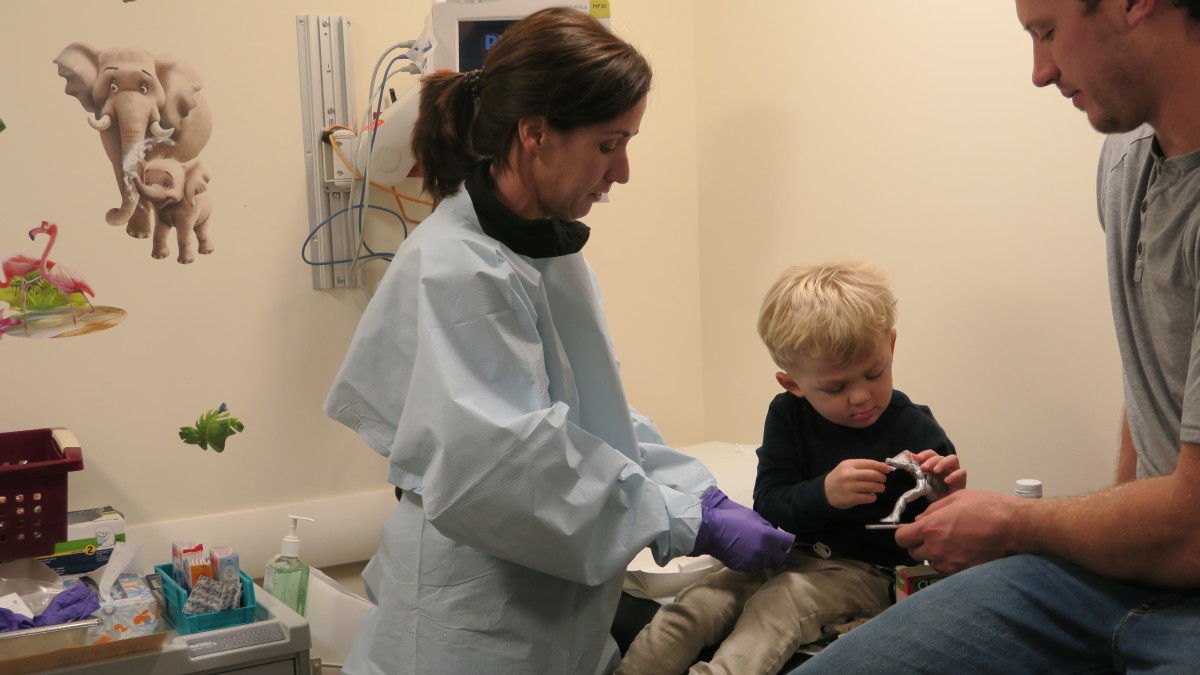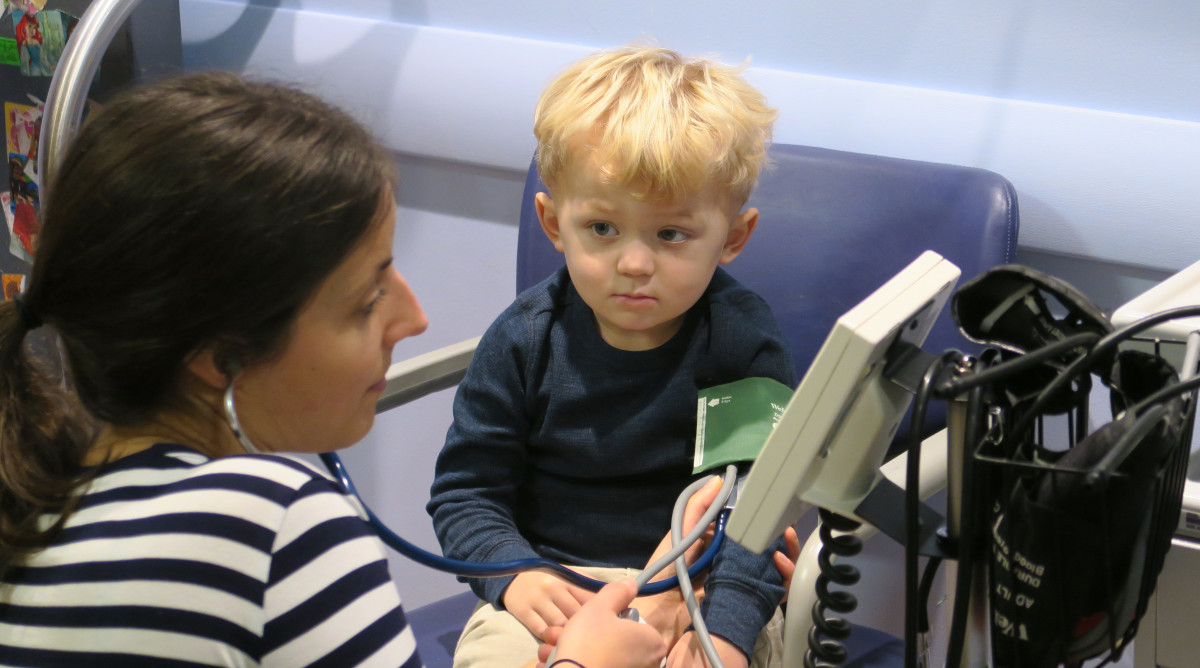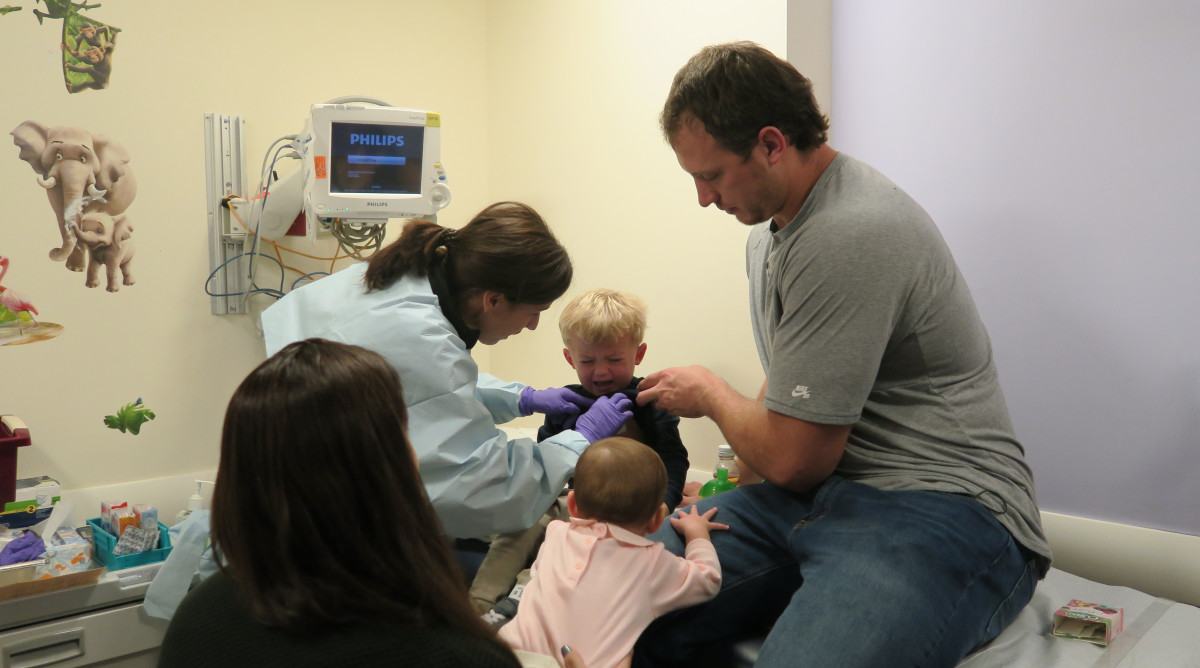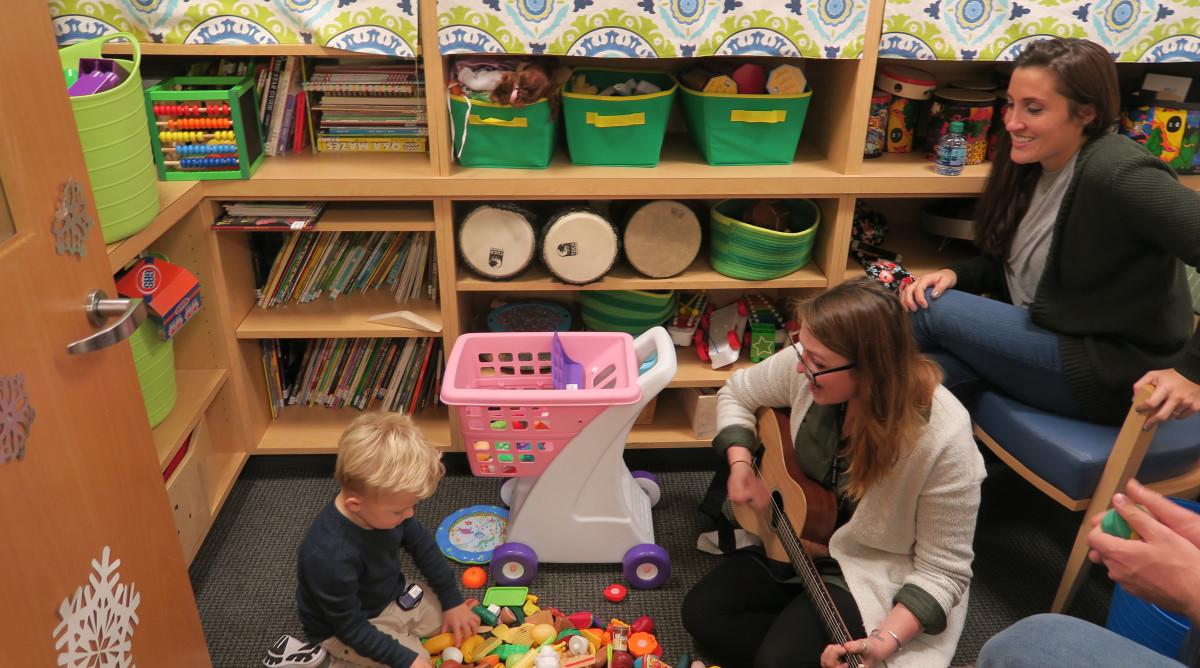For Nate, Lexi and Hudson Solder, a Patriots’ Off-Day Means Facing Their Biggest Challenge

This is one of a series of stories by The MMQB this season on NFL figures who have been affected by cancer.
BOSTON — Tuesdays are usually off days for Patriots players. Guys might do volunteer work, or sleep in or hang out at home. For New England left tackle Nate Solder, Tuesdays are chemo days.
On this “off” day in early December, Nate sits sideways on an exam room table, behind his two-and-half year-old son, Hudson, the cancer patient. They play with action figures while Hudson’s nurse cleans the left side of his chest, where a port lies just beneath the skin. The port is a small disc about the size of a quarter, attached to a vein. A special needle fits into the port and makes it easier to draw blood and deliver chemotherapy drugs directly into the vein.
Hudson has wispy, white-blonde hair, round blue eyes and a button nose, like a Precious Moments figurine come to life. His nurses and doctors say he’s a model patient, one of the best behaved at the Jimmy Fund Clinic, but he gives his nurse the stink eye when she hands him a hospital mask. Accessing a port is a sterile routine, so Nate, his wife, Lexi, and even Hudson’s baby sister, Charlie, put on a mask.
“The worst part is sticking a needle in his chest, and the thing he hates the most is wearing a mask,” says Kristen Graham, Hudson’s nurse.
Reluctantly, Hudson puts on his mask after he sees Lexi hold one in front of eight-month old Charlie. It’s a tricky skill to get the needle right—one spot in the center of the disc where it needs to fits perfectly. Hudson is in great hands with Kristen. Nate calls her “the Tom Brady of port-accessing. She’s never missed.”
Kristen sticks in the needle, which is connected to a short IV tube, and Hudson scrunches his nose like he just ate something sour. Patients can often taste the saline solution that flushes out the port during accessing. It’s a bitter taste, like swallowing a big gulp of the ocean.
But the taste means he can now take his mask off. The hard part is done. It’s time for blood work. Kristen asks him, “Do you want to do your tubies?”
He nods. She hands him a glass tube with a green top, and he pushes it into the end of the small vacuum container that draws out the blood from the IV tubing connected to his chest.
“Wait until it fills up,” Kristen reminds the toddler. “Now, shake, shake, shake! Good job!” Hudson smiles and hands her the first tube full of blood. He does two more tubes, and then he’s done. Hudson has been helping draw his own blood for the last month or so.
“He’s old hat now,” Kristen says with a laugh. “He catches on very quickly.”
For Hudson, cancer treatment really is old hat, if anything can be for a two-year-old. He was diagnosed with kidney cancer in October 2015, when he was just three months old.

While giving his son a bath one night, Nate felt a strange lump on the left side of Hudson’s belly. As first-time parents, Nate and Lexi brushed it off, hoping it was just something else they didn’t know about yet, something that would go away by Hudson’s next bath time. A few days later the lump had not gone away, so they took Hudson in to see his pediatrician. The doctor speculated it could be stool, or a swollen lymph node. She didn’t seem too concerned, so the family headed home.
Early on Monday morning, Lexi’s phone rang. It was the pediatrician. I think it’s serious, she said. You guys need to get it checked out right away. I didn’t want to tell you on a Saturday because I couldn’t have gotten you in for an appointment any sooner than Monday and I didn’t want you to sit around and worry all weekend.
Filled with dread, the Solders immediately headed to the Waltham branch of Boston Children’s Hospital. The ultrasound technician scanned Hudson’s left side, where Nate and Lexi felt the lump, and then moved over to check his right side, staying there for much longer than the left. “I thought, Oh, this lady is messing it up, what is she looking at?” Lexi says.
The technician left the room to speak with the radiologist. After a few excruciating minutes of waiting, they both returned. The ultrasound technician lingered in the corner, her eyes welling up with tears. Uh-oh, this must not be great news, Lexi thought. The radiologist delivered the results. Three-month old Hudson had tumors in both of his kidneys.
The exam room suddenly felt small, as if the walls were closing in. Within minutes, the head doctor of the Waltham branch and two social workers crowded into the room and peppered the stunned parents with questions. Would they like to ride in an ambulance to Boston Children’s?
One minute Hudson was a normal baby, and the next he had multiple tumors and was offered an ambulance ride? No, no no. It was all happening too fast. Lexi and Nate insisted on driving themselves to Boston. “It was so strange, because Hudson was perfectly fine,” Lexi says. “Why would we want to go in an ambulance? It seemed like a serious question, and we were not ready for that.”
Nate and Lexi cried in the front seat on the drive to Boston Children’s. Nate looked in the rearview mirror and saw his innocent baby giggling in his car seat. He felt guilty. Wasn’t he supposed to be the provider and protector of his family? How could he let this happen? “It was heart-wrenching, because at three months old he had no idea the dangers he was in for,” Nate says. “We didn’t know either, but I felt responsible, and I felt guilty that I was bringing Hudson a lot of trouble that he just didn’t deserve.”

The Solders stayed at Boston Children’s for five days while Hudson had his port put in and received his first chemo treatment. Nate called coach Bill Belichick and offensive coordinator Josh McDaniels to tell them about Hudson’s diagnosis and that he might miss some time because of it. They were understanding and told him, Whatever you need to do, take care of your family, and this will all be here you when you get back. We know you are going to take care of business on the field.
On their last day at Boston Children’s, a nurse handed them a large binder, filled with detailed information on how to take care of the port and how to give Hudson his medicine. She sat down with the couple and reviewed each page. “It’s like taking a firehose through a straw,” Nate says of the experience. “And a lot of it has a weighty and emotional impact, so it’s hard to take in.”
A few weeks earlier, Hudson got pink eye and Lexi was nervous about giving him meds for that. “I didn’t want to give him drugs because he was so little,” she says. “And then a month later he’s starting chemo, so it was just bizarre.”
The Solders arrived back at home in Foxborough late that Friday night, with the heavy binder and a huge bag of medicine, and no idea what it all meant. They were exhausted and hungry, a reliably volatile pairing. Adding to the complications was the fact that Nate only had one functional arm. His right arm was stuck in a hard cast after season-ending surgery for a torn a biceps just a week earlier. Lexi started to make a quick dinner while Nate held a screaming Hudson in one arm and tried unsuccessfully to calm down him down. Hudson continued to wail. Lexi struggled to make sense of the six or seven different medications scattered on the countertop. The long names blurred together, and the varying dosages collided in her mind. Frustration bubbled over into exasperation.
“I can’t do this!” she shouted.
Lexi’s parents were staying nearby and arrived 20 minutes after their daughter’s desperate phone call. “I was like, lying on the floor, and they come swoop us up and save the day,” Nate says. Lexi’s dad took out a notebook and made a chart to organize when Hudson needed each medication. Her mom soothed Hudson while Nate and Lexi cooked. “That was a moment of chaos where we just freaked out,” Lexi says. “The next morning we woke up and we’re like, Okay, let’s look at the chart. We got this.”
After a full year of chemotherapy treatments at the Jimmy Fund Clinic, the pediatric cancer center at the Dana-Farber Cancer Institute, Hudson’s tumors had shrunk enough so that he was able to stop treatment in October 2016. He went in for scans once every four weeks to monitor the tumors, with good results for almost a whole year. The Solders were told there was a 50 percent chance the tumors would grow back and Hudson would need to resume chemotherapy. At the end of September 2017, an MRI showed the tumors growing back in both kidneys. He resumed chemotherapy on Oct. 3.
Hudson’s type of kidney cancer, with multiple tumors in both kidneys, is extremely rare. His oncologist, Dr. Elizabeth Mullen, who specializes in pediatric kidney tumors, says there are only about 25 diagnoses per year in America. And Hudson is in even a smaller bucket than that 25, because he has several lesions in his kidneys that might not be tumors at all, but a hyperproliferation of normal kidney cells that could turn into tumors, called nephroblastomatosis. Mullen says doctors still have no perfect method to distinguish between tumors and nephroblastomatosis.
Hudson’s future treatment plan is largely unknown since there are so few examples to base it upon. “It’s not like breast cancer or adult cancer, where you have thousands and thousands of patients and you have big studies where you can randomize people,” Mullen says. “These are tiny numbers of kids. It’s very challenging for me as a provider and for the family because it is always much easier to have a clear diagnosis and a clear plan. I have spent as much time talking to the Solders about what we don’t know as about we what we do.”
In the face of this uncertainty, Nate and Lexi are relentlessly hopeful and upbeat. They lean on their Christian faith as a foundation when there are no answers to their questions. “I don’t think we would be going through this the way we have been without our faith,” Lexi says. “God has a plan, and his purpose and timing is perfect. I believe it is all working out for good and I truly believe that Hudson’s suffering and his pain is for good.”
For Hudson, coming to the Jimmy Fund Clinic isn’t all yucky hospital masks and pokey needles. The clinic strives to be a happy place for its patients. On this December day there’s a giant bin full of hundreds of still-wrapped happy meal toys, an arts and crafts table and a Christmas tree with brightly colored ornaments. Hudson loves spending time with the music therapist, playing with his basket of animal toys and picking out new stickers (he’s known among the nurses for being painstakingly selective). He’s even fond of the belly rubs he gets as part of his physical exam, often insisting for more after Dr. Mullen is through. “He doesn’t associate belly rubs with something that is invasive or painful—it’s just something that’s fun to him,” Mullen says. “It’s been a delight to see him grow up and talk about these things. Despite everything he is going through, he is growing up healthy.”

After two years of treatments and checkups at the clinic, the Solders feel like they are a part of the Jimmy Fund family, and have made friends with many of the regular Tuesday crowd. When Nate sees new families touring the clinic, he thinks back to the initial shock of his tour, walking into the lobby for the first time just after Hudson was diagnosed. “I remember how painful it was, feeling like, we don’t belong here, why are we here?” he says. “Now, every time I see those tours coming through, I just know what those people are feeling and to some extent, the weight of the news that you just heard. My heart breaks when I see that.”
Nothing could prepare Nate for the emotional toll of Hudson’s diagnosis, but he says his own experience with testicular cancer in 2014 helped change his view of the disease. “It was shocking because I was so young and healthy and an athlete, a lot of factors that you wouldn’t associate with cancer,” he says. “So that stigma was gone by the time Hudson came along. I learned about how a lot of young men have it, children have it, it’s just something that happens in life.”
Restarting treatment this year was tough on the family, especially now that Hudson is older and starting to grasp more of what is happening to him. He doesn’t understand what cancer means, but he’s beginning to make connections. After he had his port put back in to restart chemotherapy, he said to Nate, ‘Daddy, you can take my port out. I feel better.’
“That was the first time it was like, Ohhh, he is associating his port with the treatment and not feeling well,” Lexi says.
Nate and Lexi don’t sugarcoat anything for Hudson. “We’re always fully honest with him,” Nate says. “‘Hey Hudson, this is going to hurt, but we are going to be here for you.’ We don’t use cute terms. We’ll say, ‘Hey, we are going to get chemotherapy because of your cancer in your kidneys.’ He repeats those things, and I don’t know if he knows what they mean, but I think that is helpful—just telling him what is going to happen so we can build trust between us.”
On chemo days, the Solder leave home around 6:30 a.m. for the drive to Boston, which can take close to two hours if traffic is bad. Hudson’s appointment begins around 8:30 a.m. He’ll get his vitals checked, then his port accessed and blood work done. Dr. Mullen examines him and discusses the treatment plan with Nate and Lexi. After that, the family will wait about an hour or two for the blood work to come back. Once it does, Hudson will get his chemotherapy treatment of two different chemo drugs, about a 10-minute process. The Solders usually head home around 2 or 3 p.m., and both Hudson and Charlie will fall asleep on the ride home.
Nate hasn’t missed any of Hudson’s chemo days or MRI days, and he wouldn’t miss being there for anything. For him, family comes first, football second. “We make a point to do it as a family,” Lexi says. “Twenty or thirty years from now when we look back, we can say that we were all here together.”
Solder has missed five practices and a few meetings, but he’ll always bring his iPad along with him to the clinic, in case he has any downtime in the waiting room to review the playbook. Solder’s teammates and their wives have been a support system, bringing over food to the family three times a week. Lexi and Nate are part of the Patriots’ couples Bible study group, and members use the website MealTrain to rotate the food deliveries. Once, when the roads were bad because of ice and snow after one of Hudson’s treatments, team owner Robert Kraft paid to put the Solders up in a Boston hotel.
When Dr. Mullen first met Nate and his family, she admits she knew nothing about the Patriots. Now she’ll watch every Sunday, mostly to make sure Nate doesn’t get hurt. She says her two youngest children are now “absolutely rabid Nate Solder fans.”
“I don’t think they could pick out Tom Brady on the field, but they know everything that Nate does.”

Dr. Mullen finishes up Hudson’s belly rub, and the Solders head to the waiting room, where they’ll wait for blood work to come back and then begin the day’s chemo treatment. During the downtime, Hudson runs into the clinic’s resource room. He passes the ornament-making arts and crafts station on his way to his favorite place, the music room. Music therapist Channing Shippen grabs her guitar when Hudson walks in. She knows just what song he’ll want to hear. She strums a few chords and starts to sing Taylor Swift’s “Shake It Off,” which Hudson knows from the animated movie, Sing!
But I keep cruising
Can’t stop, won’t stop moving
It’s like I got this music in my mind
Saying it’s gonna be alright
Question or comment? Email us at talkback@themmqb.com.
